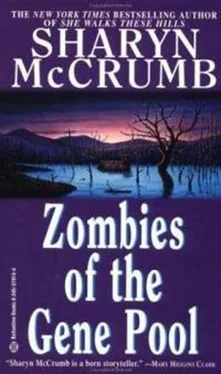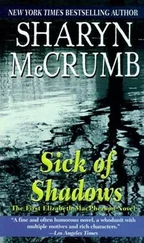Sharyn McCrumb - Zombies of the Gene Pool
Здесь есть возможность читать онлайн «Sharyn McCrumb - Zombies of the Gene Pool» весь текст электронной книги совершенно бесплатно (целиком полную версию без сокращений). В некоторых случаях можно слушать аудио, скачать через торрент в формате fb2 и присутствует краткое содержание. Жанр: Детектив, на английском языке. Описание произведения, (предисловие) а так же отзывы посетителей доступны на портале библиотеки ЛибКат.
- Название:Zombies of the Gene Pool
- Автор:
- Жанр:
- Год:неизвестен
- ISBN:нет данных
- Рейтинг книги:3 / 5. Голосов: 1
-
Избранное:Добавить в избранное
- Отзывы:
-
Ваша оценка:
- 60
- 1
- 2
- 3
- 4
- 5
Zombies of the Gene Pool: краткое содержание, описание и аннотация
Предлагаем к чтению аннотацию, описание, краткое содержание или предисловие (зависит от того, что написал сам автор книги «Zombies of the Gene Pool»). Если вы не нашли необходимую информацию о книге — напишите в комментариях, мы постараемся отыскать её.
Zombies of the Gene Pool — читать онлайн бесплатно полную книгу (весь текст) целиком
Ниже представлен текст книги, разбитый по страницам. Система сохранения места последней прочитанной страницы, позволяет с удобством читать онлайн бесплатно книгу «Zombies of the Gene Pool», без необходимости каждый раз заново искать на чём Вы остановились. Поставьте закладку, и сможете в любой момент перейти на страницу, на которой закончили чтение.
Интервал:
Закладка:
That was one thing fandom had taught her. Within its ranks she had met many talented people who could have made a fortune illustrating comic books, designing dresses, developing computer games… but. She sighed, remembering the frustration she had felt in her relationships with her fan friends. After years of stymied friendships and bitter romances, she had learned that you cannot give people ambition as if it were a virus. It is not. It is a genetic trait, and either it is waiting deep inside you to evolve, or else it is entirely absent, and it cannot be imparted to someone full of talent but lacking the drive to succeed. Nothing that anyone can do-not praise, or scolding, or work on one's behalf-can make them try.
Marion had watched her brilliant acquaintances fritter away talent that she would have killed for. The comic book creators answered endless pages of correspondence on their computers, ignoring their own deadlines, while their artistic creations died of neglect. Another gifted friend scrapped her dream of becoming a costume designer in favor of a new boyfriend who wanted to go and live in the wilds of Oregon. The computer whiz went home one night and put a bullet through his head.
Edward Arlington Robinson, thought Marion, mentally acknowledging the quote. When life became painful she always turned to literature. That was how she had become an English professor; it had been the ultimate escape from a marriage that she later compared to two years in an opium den. Only Jeremy hadn't done drugs; he had done dragons. To a sober outsider the addictions had seemed similar and equally incomprehensible.
Marion had met Jeremy when they were undergrads. He had been a computer science major, and she was a smart girl with enough personal problems to keep the psych department busy for years. She was overweight; she had no idea how to manage her thick, curly hair; and she came from a cold and repressive family. Batting a thousand, thought Marion in retrospect. Hello, Middle Earth! She had possessed all the qualities necessary for psychological emigration: she had been rejected by the world, and she was perceptive enough to know it. So she left. She still went to her classes-well, most of the time-and her parents received dutiful letters that discussed the weather and asked after the cats, but Marion was gone. She had found the real people, and joined their ranks.
The real people. Another literary reference. She wondered if Frederic Brown had ever realized the enormous impression his short story made on young egos. It was a simple fantasy story, probably suggested by the coincidence that began the tale: you are humming a song, and suddenly that very song comes on the car radio. The story's hero discovers that most of the people in the world are not real, they are like walk-on players in a film. Just there to set the stage, to create an illusion of reality. But a few people are real, the characters for whom the drama exists. Those people think and feel and care about things; everyone else is an automaton who ceases to function as soon as a real person leaves the scene. The reason the song came on the car radio was that the driver humming the tune was a real person, and he was able to will things to happen.
It was an excellent fantasy story; Fredric Brown was one of the best. But to the troubled adolescent Marion that story was not just an entertaining tale, it was a serious philosophy that explained her feelings of alienation.
When Marion read that story, she knew at once that she was one of them. She knew that she could think and feel, that she was more alive somehow than most of the bubblebrains in her dorm. So that was it. They weren't real. She didn't exactly believe that they were robots, or hallucinations, but on some deeper spiritual level she felt that she possessed something that they lacked. In medieval times, she might have termed it a soul.
Armed with her new understanding of the world, Marion neglected her classes and her correspondence in favor of the search for more real people. Every now and then she would find one- someone with whom she got along especially well from the moment they met-and she'd catch herself thinking, Ah. He's real, too.
Jeremy had been the realest of the real. They had shared the same ecological politics, the same yearning for things medieval, and the same bewilderment over contemporary society. For two years they had a wonderful relationship, exasperating their parents and their respective university departments, before Marion grew tired of the game and of Jeremy's endless defiant failures. "I couldn't take mid-terms," he would explain earnestly. "Because I had to go to Maryland for a meeting of the Shire that week. After all, I am a baron." Such priorities had seemed logical when they were dating, but when Marion was a student wife, working low-wage jobs to pay his tuition, the logic in his actions escaped her entirely. She began to feel like the sober guest at a beer blast. Finally, deciding to bet her money on her own abilities instead of his, Marion enrolled in graduate school, moved out, and never looked back.
Still, she wasn't sure she had ever got the old philosophy out of her system. She had consciously renounced it a few years later when she discovered that most of her real friends bickered endlessly and accomplished very little. Later she came to the uneasy realization that her concept of real and unreal people was very similar to the chauvinistic male's idea of women, the bigot's perception of other races, and, most troubling of all, similar to the way in which serial killers view their victims: they're not real, but I am. They don't matter, but I do. That was when the philosophy of exclusion had begun to frighten her.
Now, of course, she told herself that everyone had a soul and feelings, and that mundanes were very worthwhile people, but sometimes the old attitude came back anyhow. Just last week, Marion had been in line at the Chinese restaurant's lunch buffet, and the pixy-faced young woman in front of her had taken forever, staring at the rice and bean curd as if she couldn't remember what they were. Marion had caught herself thinking, Well, she's not real! The realization that she had thought that about someone even for an instant was an unsettling feeling. It gave her kinship with people she would rather not think of at all, and it made her wonder where such arrogance might have led. Did any of the Lanthanides share this view of reality? Now that she thought of it, it was just the opposite of Curtis Phillips' problem: Marion thought that most people weren't real and didn't matter; Curtis Phillips had fervently believed that demons were, and did.
"So tell me about Curtis Phillips," said Jay Omega, as if on cue. (Marion could never decide if Jay was real or not, but he was utterly unlike Jeremy, and that was enough.)
"Poor Curt," said Erik Giles, who had suddenly awakened. "He had such talent."
"When someone mentions Curtis Phillips, I always think of Richard Dadd," said Marion. She glanced at Jay to see if he recognized the name. It was obvious that he did not. Dadd was one of the things Marion had learned about in her "Middle Earth" period. "Richard Dadd was a mid-nineteenth-century English artist who became famous for his wonderfully complex paintings of fairy life. His paintings-surrealistic in style and much ahead of their time-were much admired, right up until the night that the artist cut his father's throat."
"Another practitioner of nonfiction?" asked Jay.
"Apparently so. He seemed to be having delusions about demons, and hearing voices ordering him to kill, so perhaps he was painting what he saw. He was tried and found insane, and they put him in Broadmoor, where he spent the remainder of his life painting increasingly bizarre landscapes peopled by demons." In lecture mode, Marion prattled happily on. "The asylum kept his paintings, and many of them are still on display there. They're worth a fortune."
Читать дальшеИнтервал:
Закладка:
Похожие книги на «Zombies of the Gene Pool»
Представляем Вашему вниманию похожие книги на «Zombies of the Gene Pool» списком для выбора. Мы отобрали схожую по названию и смыслу литературу в надежде предоставить читателям больше вариантов отыскать новые, интересные, ещё непрочитанные произведения.
Обсуждение, отзывы о книге «Zombies of the Gene Pool» и просто собственные мнения читателей. Оставьте ваши комментарии, напишите, что Вы думаете о произведении, его смысле или главных героях. Укажите что конкретно понравилось, а что нет, и почему Вы так считаете.












